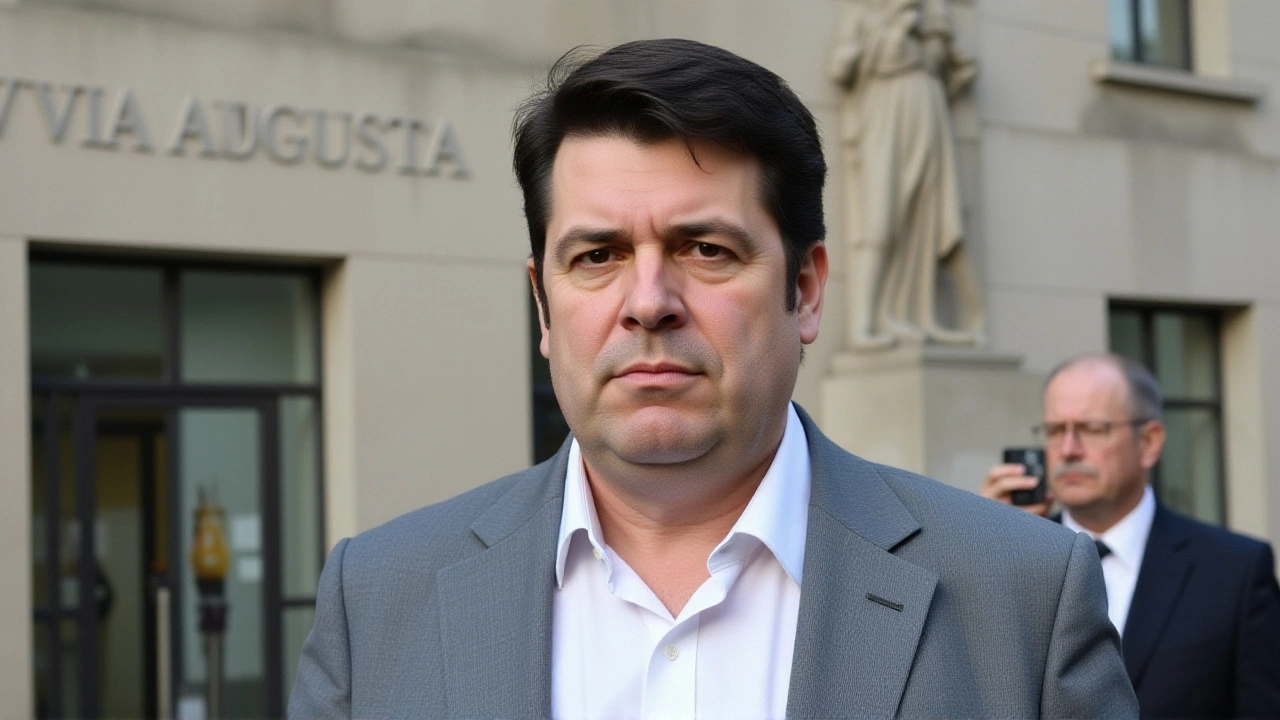On September 18, 2025, outside BBC Broadcasting House in London, Graham Linehan—the 55-year-old Irish-British creator of The IT Crowd and Father Ted—grabbed a phone from Stephanie Hayden Brooks, a 32-year-old trans activist and policy officer at Mermaids, and smashed it against a wall. The device, an iPhone 15 Pro Max, shattered. The damage? £1,249.99. But the court didn’t see just a broken phone. It saw a message. And on November 25, 2025, District Judge Margot Coleman ruled it was a hate crime.
The Moment It Happened
It was 3:15 p.m. Brooks was filming a segment for BBC Newsnight when she approached Linehan, who was waiting to be interviewed. Witnesses say she asked him a question about his public statements on trans rights. He didn’t answer. Instead, he lunged. "You won’t film me, you freak," he shouted, according to Brooks’s testimony. Security footage from BBC’s internal cameras showed him yanking the phone from her grip, swinging it once, then slamming it into the brick facade. The screen cracked. The camera died. The moment lasted 11 seconds.Brooks didn’t fight back. She didn’t scream. She called the police.
A Pattern, Not an Isolated Incident
The prosecution didn’t just present the broken phone. They presented a digital trail—147 posts, spanning 29 months, from Linehan’s now-suspended Twitter (@grahaml81) and Facebook accounts. One from January 17, 2023: "a man in a dress." Another on March 3, 2024: "a predator." And on August 22, 2025—just weeks before the attack—"I will never accept your existence."These weren’t just offensive. They were targeted. Brooks’s name, photo, and workplace were tagged repeatedly. The Metropolitan Police Service’s LGBT+ liaison unit, led by Detective Inspector Susan Wright, traced every post to Linehan’s home IP address. The court heard he’d been warned—Twitter suspended his account in June 2023. Facebook removed his profile in September 2024. He kept going.
"This wasn’t anger," said prosecutor Rachel Morgan of the Crown Prosecution Service. "It was calculation. He waited for her to get close. He knew the phone was her only weapon. He took it away. And he did it because she’s trans."
The Verdict: A Landmark Ruling
Judge Coleman’s words were precise: "The defendant’s premeditated act of violence against Ms. Brooks’s property was motivated by transphobic animus and constitutes a hate crime under Section 146 of the Criminal Justice Act 2003."It’s the first time in the UK that criminal damage to a trans person’s property has been formally classified as a hate crime under that statute. The ruling carries weight. In 2024–2025, hate crimes against transgender people rose 47% nationally—1,842 cases recorded. This wasn’t just punishment. It was a signal.
Linehan was sentenced to 12 months’ conditional discharge, ordered to pay £1,249.99 in restitution, and required to complete 200 hours of community service by May 25, 2027. He’s banned from contacting Brooks or setting foot on any BBC premises until November 25, 2026.

Reactions: Accountability and Backlash
Mermaids CEO Susie Green called the verdict "a necessary step, but not enough." In a statement released November 26, she said: "We welcome accountability, but this case highlights the dangerous escalation of anti-trans rhetoric into physical violence. The law is catching up—but society hasn’t."Linehan’s defense team, led by solicitor Mark Williams of Kingsley Napley LLP, announced plans to appeal by December 10, 2025. "There was no explicit threat," Williams argued. "No direct hate speech at the scene. The court conflated past speech with present action."
But the court didn’t. It saw the pattern. The same man who called Brooks a "predator" in 2024 was the same man who attacked her phone in 2025. The same man who testified in 2020 that "trans activism is destroying women’s rights" was the same man who refused to apologize.
The Ripple Effect
The fallout is already spreading. Linehan’s role as creative consultant on Channel 4’s Count Arthur Strong has been put on hold. BAFTA has opened disciplinary proceedings under Rule 8.2 of its code of conduct—a hearing is set for January 15, 2026, at its headquarters on Piccadilly. If expelled, he’ll lose access to industry networks, awards, and future commissions.And then there’s the broader question: What does this mean for public figures who use speech as a weapon? Linehan wasn’t charged for his tweets. But the court used them to prove motive. That’s new. That’s significant.

What’s Next?
Linehan’s appeal will test whether the UK legal system will continue to treat online hate as a legitimate precursor to physical harm. Meanwhile, Brooks is preparing to speak publicly for the first time. "I didn’t do this for fame," she told reporters outside court. "I did it so no one else has to get their phone smashed because someone can’t accept who they are."Meanwhile, the phone—now in evidence at Westminster Magistrates’ Court—is being kept intact. Not as a relic. But as proof.
Frequently Asked Questions
Why was this classified as a hate crime if no physical violence was done to Stephanie Brooks?
Under Section 146 of the Criminal Justice Act 2003, damaging property motivated by hostility toward a protected characteristic—including gender identity—counts as a hate crime. The court found Linehan’s actions were directly tied to his repeated transphobic statements, not a spontaneous outburst. The phone was a tool of expression for Brooks; destroying it was an attempt to silence her identity.
How common are hate crimes against transgender people in the UK?
Hate crimes targeting transgender individuals rose by 47% in 2024–2025 compared to the previous year, with 1,842 cases recorded nationally by the Metropolitan Police. Most involve verbal abuse, online harassment, or property damage. Physical assaults remain underreported. This case is notable because it’s the first to formally link digital harassment to physical criminal damage under hate crime legislation.
What consequences could Graham Linehan face beyond the court sentence?
BAFTA has initiated disciplinary proceedings that could result in expulsion, barring him from future industry events and awards. His contract with Channel 4’s Count Arthur Strong is on hold pending appeal. He may also face civil lawsuits from Mermaids for harassment, and his publishing deals could be terminated. Professionally, his reputation is in freefall.
Why did the court consider social media posts if they weren’t part of the criminal charge?
While the charge was criminal damage, the prosecution used the posts to establish motive under hate crime law. The court determined the pattern of abuse created a context of animus—showing this wasn’t random. This aligns with recent rulings in Canada and Australia where digital harassment has been admitted as evidence of intent in physical crime cases.
What does this mean for other public figures who oppose trans rights?
It sends a clear message: online hate, when persistent and targeted, can become a legal liability. While freedom of speech is protected, inciting hostility that leads to physical retaliation may be treated as criminal conduct. Public figures are no longer shielded by their status—their words, especially when repeated and specific, can be used to prove intent in court.
Is Stephanie Hayden Brooks planning further legal action?
Brooks has not ruled out a civil lawsuit for emotional distress and harassment. Mermaids has also pledged support for others who’ve experienced similar targeting. The case has sparked a broader campaign called #MyPhoneIsNotATarget, encouraging trans people to document and report digital abuse as potential evidence in future cases.
